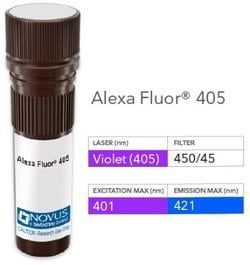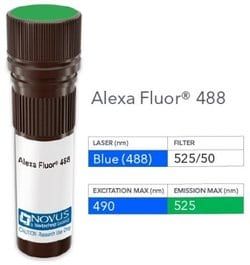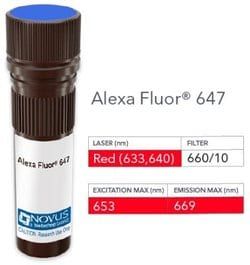alpha-Smooth Muscle Actin Antibody (1A4 + ACTA2/791), DyLight 405, Novus Biologicals™
Manufacturer: Novus Biologicals
Select a Size
| Pack Size | SKU | Availability | Price |
|---|---|---|---|
| Each of 1 | NB007189-Each-of-1 | In Stock | ₹ 57,494.00 |
NB007189 - Each of 1
In Stock
Quantity
1
Base Price: ₹ 57,494.00
GST (18%): ₹ 10,348.92
Total Price: ₹ 67,842.92
Antigen
alpha-Smooth Muscle Actin
Classification
Monoclonal
Conjugate
DyLight 405
Formulation
50mM Sodium Borate with 0.05% Sodium Azide
Gene Symbols
ACTA2
Immunogen
N-Terminal decapeptide of alpha-Smooth Muscle Actin and conjugated to KLH (1A4); Recombinant full-length human ACTA2 protein (ACTA2/791) (Uniprot: P62736)
Quantity
0.1 mL
Research Discipline
Angiogenesis, Cancer, Cardiovascular Biology, Cell Biology, Cellular Markers, Developmental Biology, Extracellular Matrix, Signal Transduction, Stem Cell Markers
Test Specificity
Actin is a major component of the cytoskeleton and is present in most cell types. It is highly specific to actin from smooth muscles. This monoclonal antibody does not stain cardiac or skeletal muscle; however, it does stain myofibroblasts and myoepithelial cells. This antibody could be used together with anti-muscle specific actin and myogenin in making a diagnosis of smooth muscle and skeletal muscle tumors. In most cases of rhabdomyosarcoma, this antibody yields negative results whereas anti-muscle specific actin and myogenin are positive. Leiomyosarcomas are positive only with anti-muscle specific actin and anti-smooth muscle actin and are negative with anti-myogenin.
Content And Storage
Store at 4°C in the dark.
Applications
Flow Cytometry, Immunohistochemistry, Immunohistochemistry (Paraffin), Immunofluorescence
Clone
1A4 + ACTA2/791
Dilution
Flow Cytometry, Immunohistochemistry, Immunohistochemistry-Paraffin, Immunofluorescence
Gene Alias
AAT6, actin, alpha 2, smooth muscle, aorta, actin, aortic smooth muscle, ACTSA, ACTVS, alpha 2 actin, alpha SMA, alpha smooth muscle actin, alpha-actin-2, alpha-SMA, a-sma, Cell growth-inhibiting gene 46 protein, growth-inhibiting gene 46, sma, smooth muscle actin
Host Species
Mouse
Purification Method
Protein A or G purified
Regulatory Status
RUO
Primary or Secondary
Primary
Target Species
Human, Rat
Isotype
IgG2a κ
Related Products
Description
- alpha-Smooth Muscle Actin Monoclonal specifically detects alpha-Smooth Muscle Actin in Human, Rat samples
- It is validated for Flow Cytometry, Immunohistochemistry, Immunocytochemistry/Immunofluorescence, Immunohistochemistry-Paraffin, Immunofluorescence.



